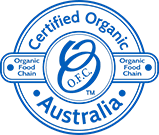The Organic Development Group (ODG), was established in 2023 to address the single biggest opportunity for the Organic Industry – domestic regulation. The ODG, which comprises the nine largest industry organisations working directly with Australian organic producers, manufacturers, wholesalers and retailers, came together in Canberra in September to actively work on the proposal we are working on to get the industry to a single regulated standard for certification of both domestic and export organic/bio-dynamic goods.
The good news is that most of the ODG were supportive of the proposed approach and work is actively underway to get us closer to domestic regulation by hitting the next milestone before the end of the year. Constructive and positive meetings have been held with MPs and Senators across all parties to advance the certified organic/bio-dynamic industry and we look forward to being able to share more specific details with you soon.
Members of the Organic Development Group include representatives from each of these organisations:
- ACO Certification Ltd (ACO)
- Australian Organic Limited (AOL)
- Bio-Dynamic Research Institute (BDRI)
- Certified Organic Biodynamic Western Australia (COBWA)
- National Association for Sustainable Agriculture Australia (NASAA)
- NASAA Certified Organic (NCO)
- Organic and Regenerative Investment Co-operative (ORICOOP)
- Organic Food Chain (OFC)
- Southern Cross Certified (SXC)
A high-level secretariat is resourced by AOL, BDRI, NASAA and OFC.
Although the ODG was formed with a specific focus on progressing domestic regulation, the collaboration it has fostered has seen progress beyond domestic regulation also
In early September, Parliamentary Friends of Australia’s Organic Industry (PFOAI) staged a lunch event during a sitting week of Federal Parliament which saw more than 200 people come together to not only enjoy the delicious food and beverages kindly donated by certified organic producers, but also created the opportunity for organic operators to share their views on the opportunities and challenges for the organic industry directly with politicians and decision makers. Speakers included politicians from both sides of politics including the Federal Agriculture Minister, Julie Collins, and the architects of the PFOAI, Liberal MP Aaron Violi, and Labor MP Dan Repacholi.
Special thanks to the BBQ sponsors including principal partner The Organic Milk Company, and major partners Angove Family Winemakers, Country Heritage Feeds, endota, Harris Farm Markets, Inglewood Organic, and Trumps.
The certified organic industry has also been active inside the halls of parliament making submissions to key parliamentary committees with influence over the organic sector
Australia’s organic certification system is world class. It requires years of effort from certified operators and involves rigorous annual audits by certifiers to ensure compliance to the National Standard for Organic and Bio-Dynamic Produce. All of Australia’s DAFF approved certifiers must hold accreditation to ISO/IEC 17065 and undergo annual 3rd party audits to maintain accreditation. In addition, the certifiers are subject to annual audits by the DAFF to maintain approved arrangements. It means that when consumers see a certification logo they can have trust in the integrity of the product. It’s critical that all organic producers, manufacturers, retailers and wholesalers, not just certified organic/bio-dynamic producers, play by the same rules or we risk eroding that trust. It is also critical that the organic/bio-dynamic industry has a voice in important matters potentially affecting our industry. This has seen representatives from ODG member organisations actively participating in submissions and enquiries.
Leading voices from Australia’s certified organic industry told a federal inquiry into food and beverage manufacturing in June they were being held back by Australia’s world-lagging approach to labelling laws. Representatives from high-profile brands including Barambah Organics, Nerada Tea, Kehoe’s Kitchen, Trumps Organics, Inglewood Farms and Hive+Wellness Australia represented the industry along with industry body AOL and certification body, ACO Certification Limited.
Representatives from the industry are also scheduled to appear at public hearings next month for the Inquiry into Australian Agriculture in Southeast Asian Markets to highlight the opportunities for export to important emerging markets and some of the practical ways the Federal Government can boost an industry that already directly contributes more than $850m annually to the Australian economy.
A number of ODG and operator organisations have also prepared submissions for and are continuing to lobby Food Standards Australia New Zealand (FSANZ), who are proposing to redefine how genetically modified (GM) foods are classified ( Proposal P1055) which could have serious consequences to the integrity and traceability of organic food both in Australia and NZ.
September is also the month that our industry comes together to celebrate the quality, richness and incredible diversity of Australia’s certified organic industry and seeks to elevate the distinct advantages to consumers of going organic as part of Australian Organic Awareness Month
This year there has been a flurry of activity from operators, boosted by the increasing levels of support from retailers, consumers, celebrities, producers and politicians, to put certified organic production and its health, environmental and animal welfare benefits front and centre (even Ryan Reynolds has been involved – well at least the Aussie one).
There have been cooking demonstrations on national television featuring certified organic produce and products, a media campaign that has placed a focus on key educational messages each week, organic dishes created by celebrity chef Tom Walton, and a digital campaign that has seen a five-fold increase in interest and engagement on last year’s campaign.
Supermarket giants Coles, Woolworths and Harris Farm have been active supporters of Certified Organic in September with television advertisements highlighting organic products, catalogue and website promotions, upgrades to instore merchandising, online specials and recipes that feature organic produce.
These combined and concentrated efforts, which are seeing our industry increasingly work collaboratively together are building momentum with end goal of increasing the health and wellbeing of our customers and our industry.
What the ODG Secretariat have to say about domestic regulation
“The ODG is focussed on solving the single biggest opportunity for our industry – the need for domestic regulation of a single standard for organic certification for domestic and export production in Australia,” Australian Organic CEO Jackie Brian said.
Organic Food Chain Director, Kari Martin, said “The industry needs a regulated domestic organic standard to ensure the rigorous certification and inspection processes that certified operators go through to be certified are not undermined.”
Sue Armstrong, Chair of BDRI, Organic and Australian Demeter Bio-Dynamic certifying body, said “Domestic regulation would be welcomed in the sector. A strong domestic regulatory framework is essential in ensuring that integrity and consumer confidence in the organic/biodynamic industry is maintained.”
National Association for Sustainable Agriculture Australia (NASAA) General Manager, Damien Rankine, said “There are important levers the Federal Government can pull to enable producers and manufacturers to open up new markets, increase their share in existing ones, and promote sustainable agricultural practices that lead to safer and more sustainable food production systems.”
“We don’t want to miss out on these opportunities, and if we grasp them, it will be to the benefit of all Australians,” Mr Rankine said.
Thank you for your support!





